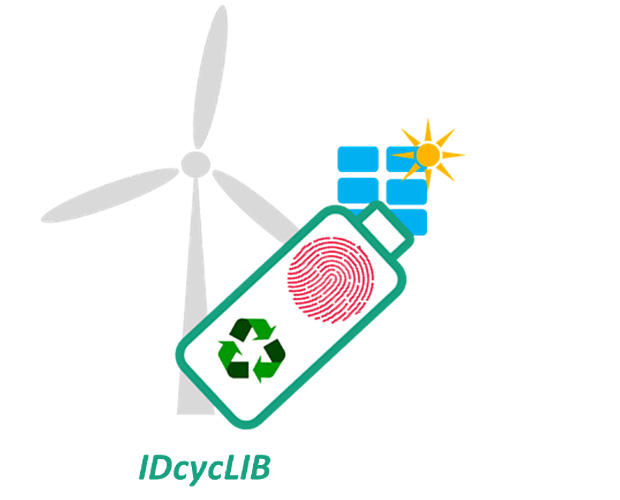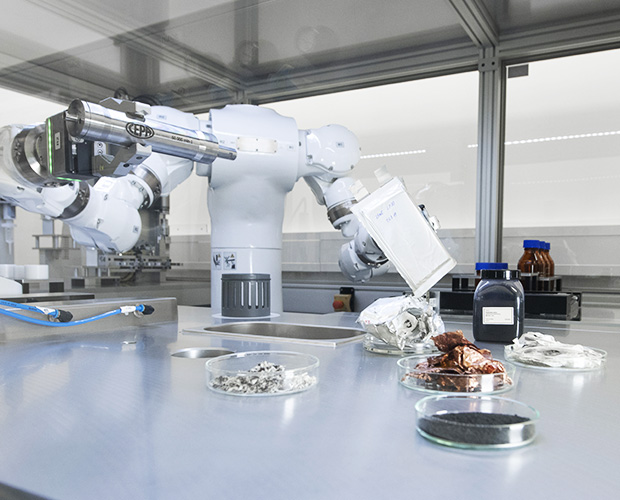IDcycLIB: Innovation platform of a green, detectable and directly recyclable lithium-ion battery

With increasing registration numbers of electric vehicles, sustainable production and recycling of traction batteries are gaining in importance - literally. Thanks to coordinated joint research efforts, battery cells should also be able to be produced in Germany and Europe in the future. Against this background, cell production processes must be as environmentally friendly and battery materials must be recovered and reused as efficiently as possible. Only in this way can battery-based electromobility become truly future-proof and sustainable.
However, as things stand today, relatively little is known about traction batteries installed in vehicles in terms of, for example, their respective components, cell chemistry and condition. This makes recycling and reuse difficult and expensive, and thus economically unattractive. The recycling capacities available to date are correspondingly low. In addition, cell and battery concepts have not been well equipped for digitization to date.
Five pillars for a sustainable and economical battery cycle
In the IDcycLib project consortium, 12 partners from industry and research have joined forces to make a coherent sustainable and industry-ready concept for battery cell production, recycling and reprocessing transferable.
The concept is built on five pillars:
"Green" battery cells - water-based manufacturing processes for battery electrodes and functional materials (no solvents and process chemicals of concern).
Design for recycling - battery cells should already be easy and automated to disassemble by their design and the nature of their components, and the functional materials can be easily and cost-effectively sorted and processed for reuse in new batteries.
Detectability/battery passport/digital twin - the cell components are coded with tamper-proof particulate markers that can be read automatically. This enables automated presorting according to cell chemistry and components, separation and reprocessing processes are simplified, and material flows are digitally recorded.
Efficient recycling processes - gentle water-based electrohydraulic disassembly and material-sensitive sorting with novel centrifuge technology ensure high purity of recovered material fractions for subsequent regeneration.
Life Cycle Assessment and Life Cycle Costing - the digitally recorded material flows can also be evaluated and controlled on the digital data exchange platform.
With these five pillars, the IDcycLib joint project provides a validated set of tools for the future-oriented fabrication of environmentally friendly battery cells that are equipped for digital data management. This not only makes battery recycling economically attractive, but also creates interfaces for future innovations - e.g. digital recording of the cell condition.
The project consortium
Ten financially supported partners and two associated partners form the project consortium for IDcycLIB with a total financial volume of over 6.9 million euros, of which 4.5 million euros come from the BMBF. In addition to Fraunhofer ISC with its Electromobility R&D Center FZEB, the consortium also includes the Friedrich Alexander University of Erlangen, with which intensive collaboration has been established since Prof. Mandel was appointed to the FAU - IDcycLIB is the first major publicly funded joint research project between the two institutions in this constellation.
Funding authority:
Batterie 2020 Transfer (BMBF)
(Funding reference 03XP03938)
Project duration:
10/01/2021 – 09/30/2024
Project coordinator:
Carl Padberg Zentrifugenbau GmbH (CEPA)
Partners:
- Carl Padberg Zentrifugenbau GmbH (Koordinator)
- Fraunhofer Institute for Silicate Research ISC
- Fraunhofer Institute for Integrated Circuits IIS
Project Group Magnetic Resonance and X-Ray Imaging (MRB)
- Friedrich-Alexander Universität Erlangen-Nürnberg
- Polysecure GmbH
- Pure Devices GmbH
- REELEMENTS GmbH
- Leclanché GmbH
- iPoint-systems GmbH
- IFU Institut für Umweltinformatik Hamburg GmbH
- EurA AG
- BASF SE (associated partner)
- LecLanche (associated partner)
